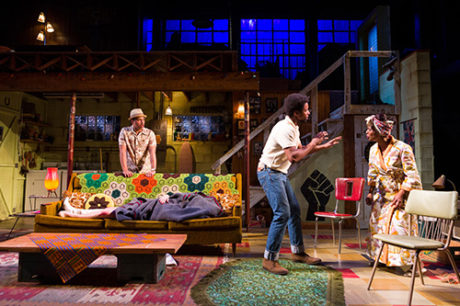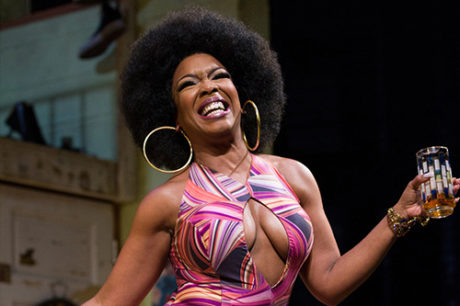Centerstage closes out its 2015/16 season, culminating with internationally award-winning playwright/actress/television writer Dominique Morisseau’s powerful period piece Detroit ’67.

Set during the five July days of the infamous 1967 Detroit riots, Detroit ’67 explores the dynamics of five compelling characters living at the epicenter of the violence, focusing on brother and sister Lank (Amari Cheatom) and Chelle (Michelle Wilson) who make ends meet by hosting late-night parties in the basement of their childhood home. However, when an enigmatic woman unearths her way into their lives, the siblings begin to spar over more than the family business.
Despite the deadly destruction and vehement violence that summer, Detroit in 1967 was also well-known for its Motown music (nearly every single from the legendary label released that year became a nationwide hit), which is tactically threaded throughout the fastidiously-adorned production (impressively styled by Scenic Designer Michael Carnahan and Costume Designer Dede Ayite) crystallizing the complicated history centralized in Morisseau’s timely drama.
“Baltimore and Detroit have a lot in common – from our thriving cultural renaissances to our experiences with social injustice – and this moving play has incredible relevance for both cities,” said Centerstage Artistic Director Kwame Kwei-Armah.
Deftly directed by Kamilah Forbes, the stellar five-member cast delivers exceptionally heartrending performances from start to finish, garnering an enthusiastic standing ovation opening night. (A special nod to production dramaturg Lauren Imwold).
Beginning with Wilson’s Chelle as she grooves to a recording of the Temptations, the introduction of mysterious Caroline (convincingly portrayed by Sarah Nealis), who shares Lank’s (formidably rendered by Amari Cheatom) love for Motown’s greatest hits and periodically peak moments of comic relief outstandingly offered by Jessica Frances Dukes’ sassy Bunny and Brian Marable’s slick Sly, nearly every scene is soul-bearing and impressive.

Fueled by the spirited sounds of Motown in flurries of explosive lighting by Jen Schriever, reverberating sound effects by Justin Ellington, and newsreel-style video projections by Alex Koch, Detroit ’67 is a riveting and relevant reminder of how far our nation has come in the past 49 years and how much further it has to go, underscoring the importance of family support and friendship in times of social unrest.
Running Time: Approximately two hours and 30 minutes, with a 15-minute intermission.
Detroit ’67 plays through May 8, 2016 at Centerstage performing at Towson University’s Mainstage Theatre — 1 Fine Arts Drive, in Towson, MD. For tickets, call the box office at (410) 332-0033, or purchase them online.
RATING:






Just saw the play today. Every actor played well, the lights, costume and staging were fine. However, the dialogs were lame and repetitive. It had all of today’s whining and preaching of the politically correctness speech we have to swallow everywhere and everyday. I was bored and unmoved. It was all cliches: women and blacks are both the pure victims of the mean white man ( evil, corrupt violent cop vs the nice,cool white girl and the well intentioned, kind, resourceful black folks). Cliches, predictable denouement, nothing was said that we have not heard a thousand time. Liberal propaganda at its lamest.All that was missing was some “black lives matter” tee shirts to be sold at the entrance and some free hugs folks embracing us at the exit. and even for those who like this sort of thing: The play would have gained in tempo and charisma if it had been condensed in one hour. instead of repeating itself for almost 3 hours. In comparison, “a night in Miami” attack some of the same issues with potency, realism, verve, and panache.
Balamoussa
[email protected]